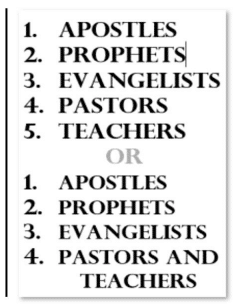The fivefold ministry is a term used to describe the five governmental offices that some Christians believe are for the Christian church today. They derive the five from Eph. 4:11, “And He gave some as apostles, and some as prophets, and some as evangelists, and some as pastors and teachers.” In light of this verse, there are two important questions. First, are these five offices for the present church? Second, are there five offices or four? Let’s take a look.
Generally speaking, churches that hold to the fivefold ministry are very charismatic and tend to support the positive confession error. This is the teaching that Christians are supposed to be healthy and wealthy and that sickness is due to sin. Those in this movement often claim to hear the voice of God, speak in tongues, and get revelation knowledge.
Now, I have no problem with the continuation of the charismatic gifts per 1 Cor. 1:7, but their abuse is dangerous, particularly when they are united with a movement such as the fivefold ministry. They tend to elevate individuals to places of authority they were never intended to have as well as push doctrines that are not taught in Scripture.
Is it fivefold or eightfold?
“But now God has placed the members, each one of them, in the body, just as He desired….And God has appointed in the church, first apostles, second prophets, third teachers, then miracles, then gifts of healings, helps, administrations, various kinds of tongues” (1 Corinthians 12:18, 28).
We see here that Paul lists eight things appointed in the church. Three of them are found in Ephesians 4:11, but five more appear here. Therefore, is God giving an exhaustive list of offices in Ephesians 4:11 by which the church operates? I think not. Why, therefore, do those adhering to the “fivefold ministry” focus so much on Ephesians 4:11? In my opinion, it is because of their desire to have a hierarchical control structure. Remember, people often exalt themselves.
“Since we have gifts that differ according to the grace given to us, each of us is to exercise them accordingly: if prophecy, according to the proportion of his faith; if service, in his serving; or he who teaches, in his teaching; or he who exhorts, in his exhortation; he who gives, with liberality; he who leads, with diligence; he who shows mercy, with cheerfulness” (Romans 12:6–8).
In Romans 12, Paul speaks of different gifts in the Christian church. He lists prophecy, service, teaching, exhortation, giving, leading, and showing mercy. As we look at more Scripture, we see that the so-called fivefold ministry might not be as precise as is biblically necessary.
Are the offices for today?
Are there supposed to be apostles and prophets in the Christian church today? But we have to ask what are apostles and what are prophets? After all, we know that evangelists, pastors, and teachers are in the church today.
One of the important questions here is, are there apostles for today? But this would depend on how the word apostle is defined. Biblically speaking, Paul defends his apostleship when he says, “Am I not free? Am I not an apostle? Have I not seen Jesus our Lord? Are you not my work in the Lord?” (1 Cor. 9:1). Notice, that he appeals to his apostleship by the fact that he had seen the risen Christ. If there are apostles today, do they need to hold this requirement as well? What’s more is that there are different kinds of apostles listed in Scripture. There are those who were among the original 12 (Acts 1:21-22), as well as those who are simply sent (2 Cor. 8:23; Phil. 2:25). And there are false apostles (2 Cor. 11:13). Also, you might be surprised to find out that Jesus is called an apostle (Heb. 3:1). So, depending on how the word “apostle” is defined, we may or may not have apostles for today.
Are there five or four offices?
The fivefold ministry that is described in Ephesians 4:11 may not be legitimate because of an interesting Greek construction. Remember, the New Testament was written in Greek. I wanted to look at what the Greek actually says. But, I need to explain some grammar. In English, the “definite article” is the word “the.” in Greek, the definite article for the word “the,” is ὁ, pronounced ‘ho.’ Now, in Greek, the nouns decline. Declining means a change of form, but it is still the same word. A close example in English could be actor, actors, and actresses. In Greek, the word “the” takes different forms, and in Ephesians 4:11, it is τοὺς (tous). So, let’s take a look:
| Ephesians 4:11 τοὺς = ‘the’ “the apostles, the prophets, the evangelists, the pastor and teachers” |
||||
| And | He | gave | some as | apostles |
| καὶ | αὐτὸς | ἔδωκεν | μὲν δὲ | τοὺς ἀποστόλους |
| kai | autos | edōken | men de | (the) tous apostolous |
| and some as “some as” is not in Greek, but is implied |
prophets | and | some as “some as” is not in Greek, but is implied |
evangelists |
| τοὺς προφήτας | δὲ | τοὺς εὐαγγελιστάς | ||
| (the) tous prophētas | de | (the) tous euangelistas | ||
| and | some as “some as” is not in Greek, but is implied |
pastors | and | teachers |
| δὲ | τοὺς ποιμένας | καὶ | διδασκάλους | |
| de | (the) tous poimenas | kai | didaskalous | |
| Italics are implied from context and required for English syntax | ||||
Therefore, the literal translation of Ephesians 4:11 would be, “And He gave some as the apostles, the prophets, and the evangelists, and the pastors and teachers.” Notice that the definite article, “the,” occurs four times, not five times. This then raises the issue of whether or not the final group of words “the pastors and teachers” are considered the same office. Please consider the following quote:
“Evangelists were those engaged in spreading the gospel, similar to present-day missionaries. Pastors and teachers are listed together because they are governed by one article (“the” occurs before “pastors” but not before “teachers”) and because the word “and” (kai) differs from the other “ands” (de) in the verse. This may imply that these are two kinds of gifted people whose ministries are among settled congregations (rather than itinerant ministries like those of the apostles and evangelists). More likely, they refer to two characteristics of the same person who is pastoring believers (by comforting and guiding) while at the same time instructing them in God’s ways (overseers or elders are to be,”…able to teach” 1 Tim. 3:2, Titus 1:9).
Walvoord, John F., and Roy B. Zuck, Dallas Theological Seminary. The Bible Knowledge Commentary: An Exposition of the Scriptures. Wheaton, IL: Victor Books, 1985.
Conclusion
There is a lot of controversy over the fivefold ministry model. Considering what Paul also said in 1 Cor. 12:28 about other parts of the Christian church, the fivefold ministry is only an illustration of what the functionality is within the body of Christ. In my opinion, the fivefold model is not warranted.
Other articles worth reading on this topic are






